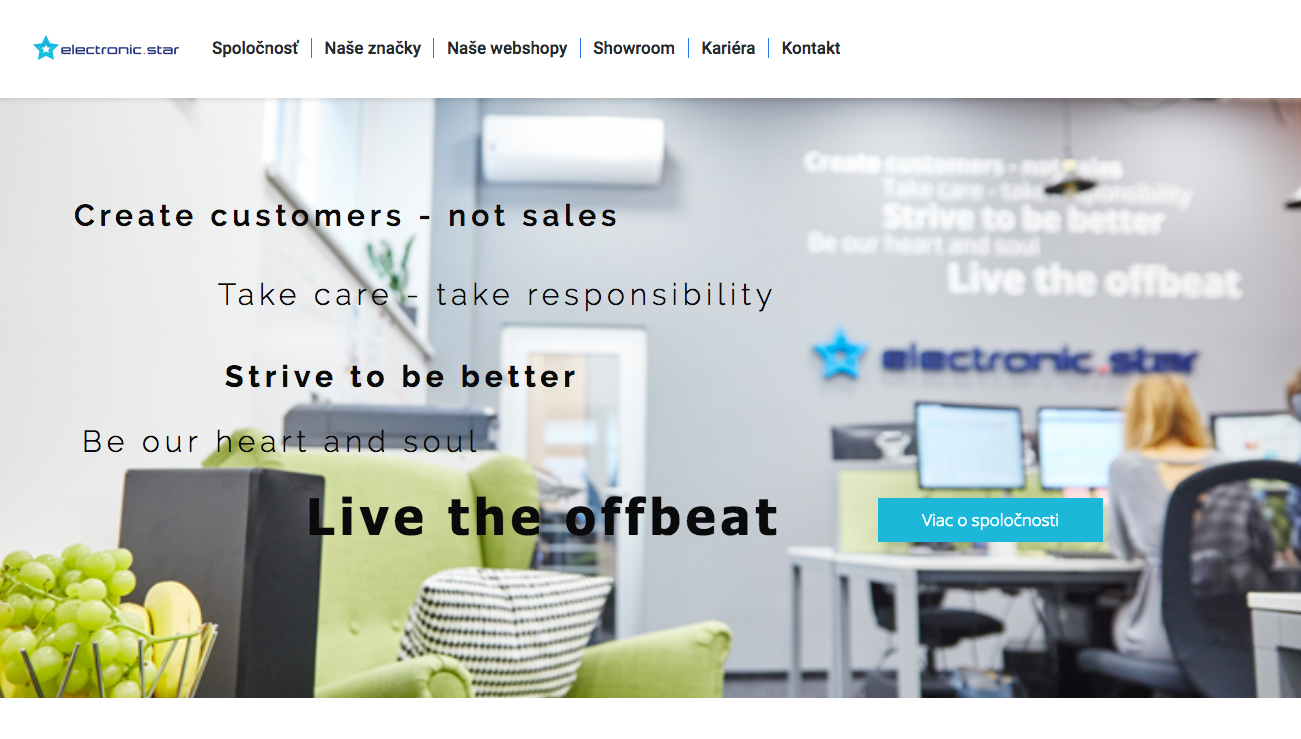
Electronic Star is a successful e-commerce business present in 7 countries across the CEE region with 20 e-shops and B2B distribution. The founders, Dominik Brichta and Peter Both, met at high school and prior to Electronic Star, they started another business together.
Electronic Star has a combined 13 white goods, sound & light and fitness brands which are designed in Berlin. One of their advantages is their use of own distribution network, design centre in Berlin, and production facilities in China, which can be refected in a more favorable price for customers. The products are designed and updated based on the feedback from customers across Europe.
Dominik and Peter decided to build their future with their own hands and started their business during university. Peter learned from his parents company and caught the entrepreneurial spirit from an early age.
Interview with Dominik Brichta and Peter Both (SVK only)
Electronic Star was based on a true friendship, which they then used as one of the pillars of their business. Dominik says: “Even though we sometimes have very different ideas about innovating our business or moving it forward, we have never argued about it. It is thanks to very clear boundaries and respect we have for each other. I would recommend to every entrepreneur to clarify expectations and visions to prevent any disputes in the future.”
Being part of a scale-up business also means you are a multitasker and a quick learner from store manager to accountant and strategist. One of their key messages is the need for attention when leading a company, which means getting very good at every day mundane tasks and persevering.
Company culture is extremely important when the company needs to grow organically and helps to encourage employees to learn and grow. The founders of Electronic Star want to lead by example with their hands-on mentality and “live for the company”.
 One of the biggest obstacles was to find the right talent. At the beginning they needed skilled professionals with experience in e-commerce, but they were unable to attract them to a startup, even one with a bold vision. Their goal is to engage young people who are quick learners and can adapt to the culture and fast growth of the company. The first employees were selected to become the next managers. The selection process was quite complex with multiple rounds and a meeting with a psychologist.
One of the biggest obstacles was to find the right talent. At the beginning they needed skilled professionals with experience in e-commerce, but they were unable to attract them to a startup, even one with a bold vision. Their goal is to engage young people who are quick learners and can adapt to the culture and fast growth of the company. The first employees were selected to become the next managers. The selection process was quite complex with multiple rounds and a meeting with a psychologist.
Peter: “We wanted to make absolutely sure that the people we started with were the right ones to help us grow. More than half of them are now managers and lead Electronic Star forward.” Employees are encouraged to grow with the company and use their entrepreneurial spirit to proactively become leaders within 2-3 years. In 2017 we have a team of 50 people in Bratislava serving all our markets from our headquarters.
Processes change quite often in the fast-growing firm. Electronic Star grew 100% annually since its inception in 2012. Sometimes they have to change a process two or three times a year reflecting the growth that they have experienced. Peter says: “The key is to have a clear vision where the company is going and what leaders they need to help them grow. Currently we have 6 heads of departments coordinating over 50 people which we are planning to increase to 75 people.”
In 2016 we have passed a significant milestone of a turnover of 10 million EUR . Building a company such as ours required considerable capital. The company was never backed by an external investor, or from a bank, so what the company is and has now has been bootstrapped with the founders’ efforts. The founders decided not to pay any dividends or receive any salary for the first five years.
The future expansions to the new markets in the Balkans and Eastern Europe will be financed by their own profit and in the case that they need more capital they envision financing the company via bank loans that would allow them to keep their equity and allow them to make fast decisions in the rapidly changing e-commerce landscape.
Dominik and Peter see the role of government as closely cooperating with the private sector and tailor its programs to the needs of growing and emerging sectors. Fast-growing companies could be encouraged and supported by bringing experts from specific fields from abroad to help local companies with scaling and internationalizing their activities.
This article is brought to you in cooperation with SAPIE. To read the previous post about the data behind scale-ups, click here.